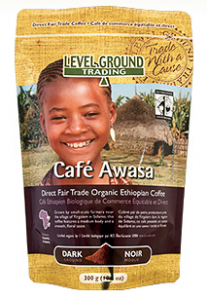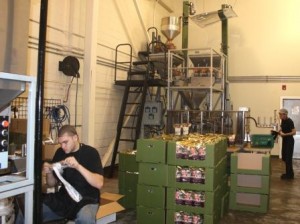 You go to the store. You look for the fairly traded coffee. You make the purchase. What now? Who benefits from your purchase? Sure, you’re a satisfied consumer. And, it’s more than just the coffee tasting good. You’ve just, through your purchase, contributed to a making the world a better, fairer place. Really? Have you really just made the world a better place? Have you really influenced the living conditions of coffee farmers and producers half a world away? This is a challenge Level Ground Trading (Level Ground) works continuously to bridge; finding ways to build a successful business that both improves the conditions of producer communities AND addresses consumer interests.
You go to the store. You look for the fairly traded coffee. You make the purchase. What now? Who benefits from your purchase? Sure, you’re a satisfied consumer. And, it’s more than just the coffee tasting good. You’ve just, through your purchase, contributed to a making the world a better, fairer place. Really? Have you really just made the world a better place? Have you really influenced the living conditions of coffee farmers and producers half a world away? This is a challenge Level Ground Trading (Level Ground) works continuously to bridge; finding ways to build a successful business that both improves the conditions of producer communities AND addresses consumer interests.
Why I choose Level Ground coffee
Level Ground coffee is a fixture in my life. I regularly visit my local Ten Thousand Villages, a major retailer of Level Ground coffee, and where I go to chat with the friendly staff, and purchase my Level Ground coffee (Ethiopian Cafe Awasa in picture above is my favourite). I choose Level Ground for my bulk coffee purchases because the coffee is roasted locally, by Level Ground, and tastes excellent. An even bigger reason for me though is that Level Ground is a company that has found commercial success, all the while incorporating sustainable business practices that put people first. Wanting to know more about the Level Ground story, I connected with Stacey Toews, co-founder of Level Ground, at the Level Ground head office and roasting facility in Saanichton, near Victoria, BC.
 Direct business relationships…
Direct business relationships…
Stacey tells me Level Ground has formed direct business relationships with coffee producers in five countries (Ethiopia, Tanzania, Columbia, Peru, Bolivia). Coffee is grown, picked, bagged, and shipped in containers to the Level Ground facility just outside of Victoria. There, the coffee is roasted, packaged, and distributed to local retailers, and Ten Thousand Villages stores across North America. Level Ground staff interact, personally, with all players in the business cycle; from talking to farmer producers in Tanzania, to sales partners, to engaging the consumer public at trade shows.
Leading to sustainability
For Level Ground, the essence of these direct trading relationships is a commitment to dialogue, transparency and respect. This is why they are a Fair Trade Organization, accredited by the World Fair Trade Organization.
The Copenhagen Climate Talks are underway. There will be much talk there about a sustainable future, about cross-border solutions, about relationships between countries. I asked Stacey for his perspective on those same topics. This video contains his passionate, insightful response. (if you can’t see the video, click here)
Here’s a summary of Stacey’s ideas, shared in the video:
- The essence of sustainability is relationships
- Sustainability flows from long-term relationships
- Long-term contracts with disadvantaged producers makes it easier for them to adopt good environmental practices
- Long-term relationships require building trust
- Focus on producers over consumers; this is the Fair Trade way
- Focus on social action before climate action
- People who make the worst choices for the environment are the richest and the poorest (people who have the most and are uncaring, and people who have the least and are desperate)
- Up-front (company) due diligence is vital to creating viable, sustainable business relationships; e.g., will product quality be there? Is there market demand for the product?
- The long-term speaks to sustainability for everybody
A bit more on Fair Trade
What happens when everyone jumps on the Fair Trade bandwagon? To start with, confusion in the marketplace. Both Level Ground, a company of 35 people, and the Nestle company, a mega-corporation, sell coffee they promote as fairly traded. There is a difference between what each company calls Fair Trade. You knew that, right? If not, here’s a quick primer on Fair Trade, along with links where you can immerse yourself, in the continually evolving Fair Trade story and (sometimes messy) plot lines!
The Max Havelaar label, the world’s first Fair Trade Certification Mark, was officially launched in 1988. The label, used to distinguish Fair Trade products from conventional ones, aimed to improve “the living and working conditions of small farmers and agricultural workers in disadvantaged regions”.
The World Fair Trade Organization (WFTO) is a global network of Fair Trade Organizations that have Fair Trade at the heart of their mission statement. It is the only global network whose members represent the Fair Trade chain from production to sale. Monitored by the WFTO, Level Ground must commit to, and apply, the ten standards of Fair Trade practice, as prescribed by the WFTO, in order to maintain its status as a Fair Trade Organization.
The labeling of products as Fair Trade is a different matter. The Fair Trade Labeling Organization (FLO), based in Germany, is the largest and most widely recognized standard setting and certification body for Fair Trade products. FLO is an umbrella organization that unites 20 labeling initiatives (including Transfair Canada and Transfair USA) in 21 countries, and Fair Trade certified producer organizations in Central and South America, Africa and Asia.
Ok, big question
You see two competing Fair Trade products, which do you choose? Why?
Enjoy your coffee!
If you enjoyed this post, please consider leaving a comment or subscribing to my blog. Always appreciated, Ben.

I was surprised while shopping in Costco to see “genuine Belgian Hot Chocolate- fair trade”. It does have the “Fair trade certified “logo as well. The black and white person with 2 bowls standing in front of the world.
I brought it home for the kids to try!
Your article about this good post is really gripping. I would select the essay writers to buy an essay or buy research paper just about this good topic, because its the good way.
Hi Katy, Glad you found something that was both fairly traded AND something which, in all likelihood, will be a hit with your family. Cheers, Ben.
Hi Ben, thanks for this article and for the very nice comment about Ten Thousand Villages (OK, I admit it, I work at a Ten Thousand Villages store and so I’m probably a litttle biased!!).
It’s great that more and more people are becoming sensitive to the social impacts of their purchasing decisions (Katy, I do hope your kids enjoy that hot chocolate and good for you for being interested enough to look at the label). Hopefully, as all businesses respond to this growing awareness it will become easier and easier for each of us to behave like “socially conscious consumers” all the time.
The nice thing about organizations like Ten Thousand Villages is that because they have been built on a passion about and committment to these ideals, you can rest assured that everything in the store is fairly traded.
In a way, this is what I think is most important about World Fair Trade accreditation… it is a return to the old idea that a person’s life is made easier if they can trust their chosen retailers.
If fair trade and social justice is important to you, then the decision where to spend your money is made simpler when dealing with credible organizations like Ten Thousand Villages and Level Ground.
Hi Maria,
Thanks so much for sharing your thoughts. I really like the points you make around trust and credibility – I think trust & credibility are at the heart of why people connect with organizations like Ten Thousand Villages and Level Ground Trading. And, I hope people visiting your store over the next few days, leading up to X-mas, are in a generous mood! Cheers, Ben.
I really admire this, I mean it really looks interesting! Very nice write up
Great Site, i like it.